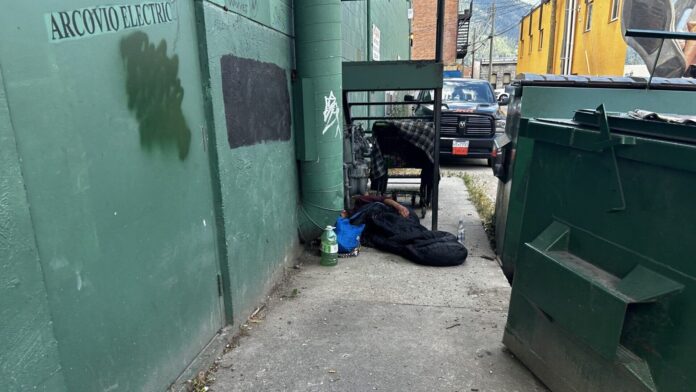The cities of Trail, Nelson, and Castlegar have joined forces in a call for a regional strategy to address the urgent and growing challenges of mental health, addictions, and homelessness.
Councils in all three communities endorsed a resolution in May in response to the increasing local need for detox, rehabilitation, and supportive housing services.
It calls on the province to expand treatment services, increase funding for housing and shelter infrastructure, and support specialized policing and crisis response teams.
Trail Mayor Colleen Jones says the idea of regional collaboration emerged in 2024 during Selkirk College’s Bridging Rural Homelessness and Wellbeing Summit, where mayors from all three communities recognized the need for a localized solution.
“We had some really good discussions about the homeless individuals in all three of our communities, and we decided that we needed to get more government involved because we are in rural B.C., and we do not get the same support and services that urban B.C. is receiving at this time,” said Jones.
She explains that those suffering from mental health and addiction issues are often forced to relocate to access care, but emphasizes how the supportive housing piece for after they return from rehab or detox is limited locally.
“We don’t have that in this area, so there’s a greater chance that people will fall off the system and end up back on the streets, unable to get help again for a while, which we see as one of the biggest issues locally right now.”
While Castlegar does have a detox facility, Jones says the supportive housing piece is critical for reintegration, noting that there are only nine beds available in Castlegar – often forcing individuals to relocate to larger urban centres for treatment.
“When you bring rural people out of their communities and take them down to urban B.C., there goes their family support and what they know of their community. Then they’re in a situation where not only do they have to learn how to live without drugs and work with their mental illness, but they also have to figure out how to fit into that new community.”
Although the Union of BC Municipalities has historically supported similar province-wide initiatives, this resolution reflects a distinctly regional approach.
Jones says it emphasizes the need for localized, community-led solutions and urges the province and federal government to provide targeted funding through mechanisms such as the Provincial Policing and Public Safety Fund and the federal Reaching Home program.
“We need more help for individuals struggling with mental health and addiction, and more support for those in our communities who are homeless. We need help with public safety in our communities, more RCMP recruitment, more people on the street who can assist these individuals. There need to be more wraparound services.”
A localized solution Jones would like to see implemented involves a regional centre that features detox, rehab, and supportive housing, in addition to life skills training to reintegrate people back into society.
“Those are the most important steps that we need at this time. As for localized mental health support, we need something a little more aggressive than what we have now. It’s a long-term illness. It’s not something that just takes six weeks to fix and then it’s over. A regional centre is where this could all happen.”
The Union of BC Municipalities has received the resolution, which will be brought forward by Mayor Jones at September’s UBCM Convention.
That said, she assures her advocacy on the issue will – and has – continued at all levels of government.
“As a municipal elected official, my goal is to advocate at every level of government that I can for my community. I’ve spoken about this at the municipal, regional, provincial and federal levels.
I’m hoping that somebody will recognize the work that’s being done here to show what the situation really is. All we want is to sit down and talk about this regional proposal, and we’re willing to work with anyone.”
You can read the resolution by clicking here.
Want to get your business noticed? Have you considered advertising through your local radio station? Speak to one of our sales agents and find out how radio advertising can boost your business today. Call 250-365-7600 or email Vista Radio.






